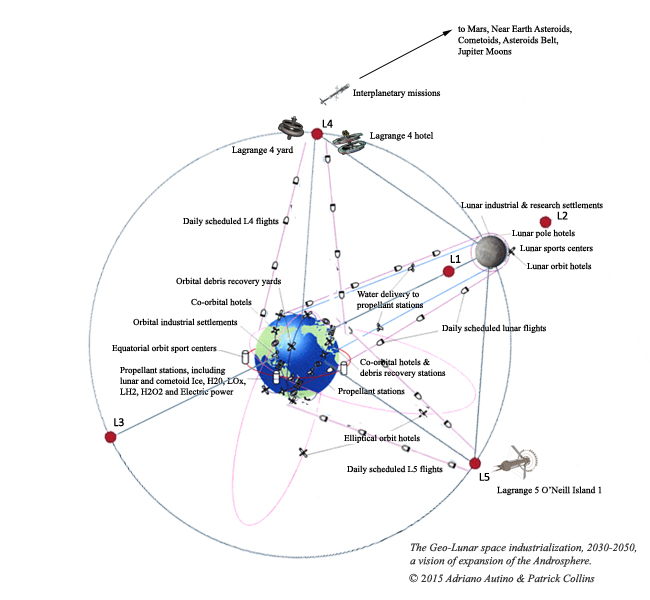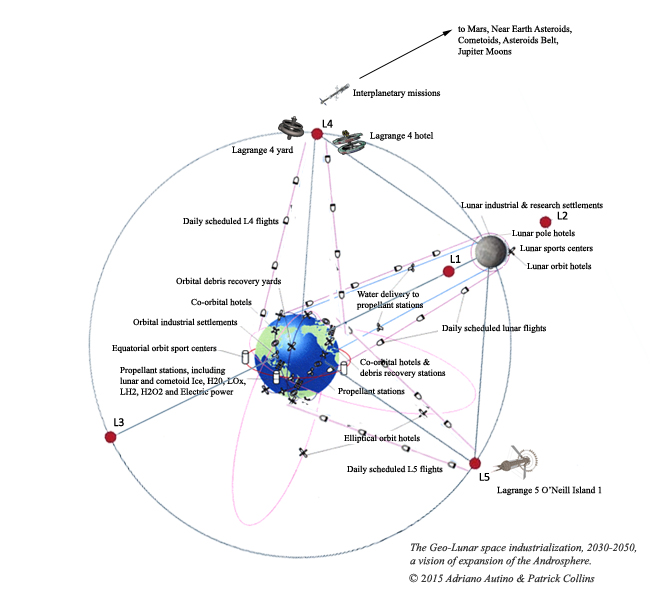
Do you believe in a space renaissance? Then join the Space Renaissance!
Collapse of Western civilization – Nowadays many economic and international relations experts talk openly about the collapse of the Western civilization and also attempt to predict the date of such a collapse with the five-year period from 2025 to 2030 considered to be “very critical”. One such example: “ Global Trends 2025: A Transformed World” was recently published by the US National Intelligence Council. (See link below).
This comprehensive document covers various topics including the development of a multipolar society, continuing population growth, limiting resources at all levels and the considerable risk of conflict proliferation including significant concerns about the spread of nuclear weapons. Within such a period, a number of crucial attributes will emerge and global conflict may erupt with long term and destructive consequences. After the fall of the Berlin wall during the last quarter of 20th century, no concrete plan for a newer world order was implemented. The West now appears to be incapable of facing declining security, the threat of terrorism, the deficits of a so called postmodern era and is unable to protect its citizens and its newer generations from the threat of violence. After witnessing the recent disruption of many national societies including those in the Middle East and North Africa, the West, however, has failed so far to propose any further reiteration of the democratic social model which could feasibly contribute towards global stability, development and world peace.

War, “hygiene of the world”? – Looking at the past, it is often assumed that when a civilization finds itself in an implausible, stagnant or declining state, progress is “awakened” by crisis and warfare: shock and trauma are regenerators or even the “hygiene of the world”, as was defined by Marinetti’s futurism in 1909.
The current expectations of our many global societies could be summarized by future historians within the expression “the decline of Western civilization”, and it could find its epilogue in what may be large and highly generalized conflicts. Such a decline could be partly balanced trhough the collaborative development of the emerging Eastern countries including China, Asia and Russia as well. Even so, the potential of these entities will be considerably slowed by a lack of resources and greatly hampered by the still ruling philosophy that sees our planet as a closed environment. Even if warfare were still considered to be ethically acceptable, if indeed it ever was, for a number of reasons it does not seem to be a very useful “tool” in the world of today.
The wars of the past are extinct prospects: they were declared among nation states, were fought between armies which destroyed multiple resources, endured and ended while triggering and ushering in territories and newer political phases. Today’s hybrid wars are more likely to be eternal and exhausting guerrilla wars, wars of long term attritions that are comprised of ethnic and cultural unrest, political adventurism, terrorism, and the suppression of civilian populations. They are also endemic and depressing, quickly affecting essential business, travel, tourism, the economy, and development in general. At this stage we find ourselves in an immanent and vertical crisis, both economically and militarily, in that global society should certainly contemplate the final prospect, i.e. this situation could lead to a tragic end game implosion of civilization. Such a threat would comprise the first time that a (globalized!) civilization might break down without another civilization ready to pick up the baton. That is why we cannot resign ourselves to a supposed “necessary evil” or having to accept “bitter medicine”, as a prelude to healing, because most probably there would be no possible compensation, or any realistic resurgence and our species might plausibly regress to an insufficient pre-cultural anthropology or, far more tragically, to an hopeless post-cultural status.
On a purely economic level, considering the desperate need to allocate immense resources to essential and large scale development projects, civilization at large can no longer afford to spend a majority of its national budgets per year on weapons and on highly unproductive and unusable rearmament. Last but not least, the destructive potential of modern weapons, especially nuclear, has greatly increased the danger of total self-destruction of civilization, though this subject might nowadays be out of fashion.
So, in a nutshell: humanity cannot tolerate war. It cannot afford it as it is useless for any purpose. Indeed, it is 100% counterproductive and regressive. Therefore, a marked change in strategies is urgent than ever before. When it is noted that the direction in which we are going may lead towards disaster, we need to change direction as soon as possible, and to set off for a new era of vigorous development, one which raises and restores hopes of social growth – a new renaissance.
A disruptive shock of new global concepts – To trigger a new renaissance we need the disruptive shock of new global concepts, but we have already seen that these cannot take the shape of warfare. Given the choice, and we do not see why we should not be able to make such choices, would we happily opt for a positive shock that brings excitement, joy and opportunity rather than death and destruction? We prefer to propose a new perspective and a new human understanding, with far reaching horizons, as opposed to providing cannon fodder for tyrannies while avoiding the squalor and the mud of misery. It would be useless to invoke stability, democracy, freedom, development and well-being, without the dignity that comes from jobs: as without offering a new type of industrial development, nothing can stand in the way of Armageddon. The most fruitful revolutions were in fact, the industrial ones. The most promising industrial revolution now currently possible, is found through the global development in the fields of innovative civilian astronautics – from Low Earth Orbit to the cislunar region of space. All the harbingers of progress now point upwards.
There is little remaining potential for new land transport industries and, although improvements will be made, we have resigned ourselves already to the decline of the oil civilization, to which we are still tied. It is not difficult to see, in fact, that the crisis which began in 2008 with skyrocketing oil prices, is now finding a fresh outbreak with the decline in oil prices, the deflation factor and hence a global economic slump. Given the pace of original technological advancement, the new urbanism is thus forced to take inspiration from the work of our most forward thinkers and original scientists. In particular we continue to reiterate enlightened 20th century thinkers such as Gerard O’Neill and Krafft Ehricke, aiming humanity towards Earth’s orbit, to the Moon, into cislunar space, and towards the Near Earth Asteroids. With science and technology humanity will look to the stars – not as a distant sky to be observed – but as an immediate three dimensional framework within which we are immersed, and through which we will need to learn how to navigate and to live. Will our children and grandchildren dwell among the stars or in the teeming wastes of urban blight and the shacks of shanty towns? The outcome depends on us today, we, seven and a half billion citizens of planet Earth. We must decide, while we still have the power to do so, whether to dedicate our energies, our governments, our taxes and our investments for warfare, death and destruction, or apply these towards the opportunities inherent in opening space frontier and the forthcoming Renaissance.
The plan to capture an asteroid, and bring it to L5 – Considering positive shocks to society, like the many major and historic projects – ideas that are comparable in scope to the construction of the Egyptian pyramids – will illustrate our case. Some examples: the plan to capture an asteroid, bring it to stable lunar orbit at L5, and creating a large rotating habitat endowed with artificial gravity; which represents just one of many remarkable concepts; or the possibility to achieve within the next 20 or 50 years a comprehensive manned lunar settlement and then subsequent trips to Mars undertaken by astronauts of all nations; or to achieve an unfolding space based information networks in LEO, accessible to all peoples in all places which can accurately investigate, describe and create the comprehensive infrastructures of a sustainable future world.

The focus on international space development will bring an impetus to the comprehensive global agenda, helping it to endow an equitable world-view and to avert the many critical threats we currently face. Amongst many innovative prospects, tax policies which are favorable to the companies in the civil astronautics will contribute to the preparation of low cost earth-orbit fully reusable vehicles leading to the development of orbital infrastructure and lunar tourism.
We will face the problem of a instable political direction. New leadership with a highly scientific, technological and cultural profile is needed. We can see a glimpse of this on the horizon, yet, unfortunately, only a beginning. But let’s do it! It depends on us!
The Space Renaissance International and its national chapters have several initiatives and public events in agenda, a possible workshop on Lagrange City at L5, and for cislunar architectures in October 2016 in Rome, and in 2017 the Space, Not War! Congress.
Want to help? Do you believe in a space renaissance? Then Join the Space Renaissance Initative!
We are looking for membership from all walks of life and all persuasions. Please join us in creating the new paradigm for the 21st century.
If your country does not have a national SRI chapter already, you can register as a member of Space Renaissance International, here:
https://spacerenaissance.space/build-sri-with-us/membership-2/membership/.
IMPORTANT: you received this newsletter as an invitation. To deliver a newsletter entails some overhead and administration, and we do not intend to send our communications to persons who are not interested, and which would therefore remain unread.
Therefore, if you like to keep on receiving our analysis, newsletters and updates about our initiatives, please subscribe to the SRI newsletter here:
https://spacerenaissance.space/build-sri-with-us/space-renaissance-newsletter-registration/.
If you have already subscribed once, there is no need to subscribe again.
Link to: “Global Trends 2025: A Transformed World”
[English editing by Amalie Sinclair & Arthur Woods]
Download the pdf English version:
https://spacerenaissance.space/media/SRI_Newsletter_17042016.pdf
Télécharger la version française, en pdf:
https://spacerenaissance.space/media/SRI_Newsletter_17042016-fr.pdf
[Edition française par Catherine Laplace-Builhe & Philippe Blanc]








 Space Renaissance France Chapter
Space Renaissance France Chapter  Space Renaissance USA, Inc.
Space Renaissance USA, Inc.  Space Renaissance Italia Chapter
Space Renaissance Italia Chapter Space Renaissance Academy
Space Renaissance Academy Space Renaissance Initiative Group
Space Renaissance Initiative Group